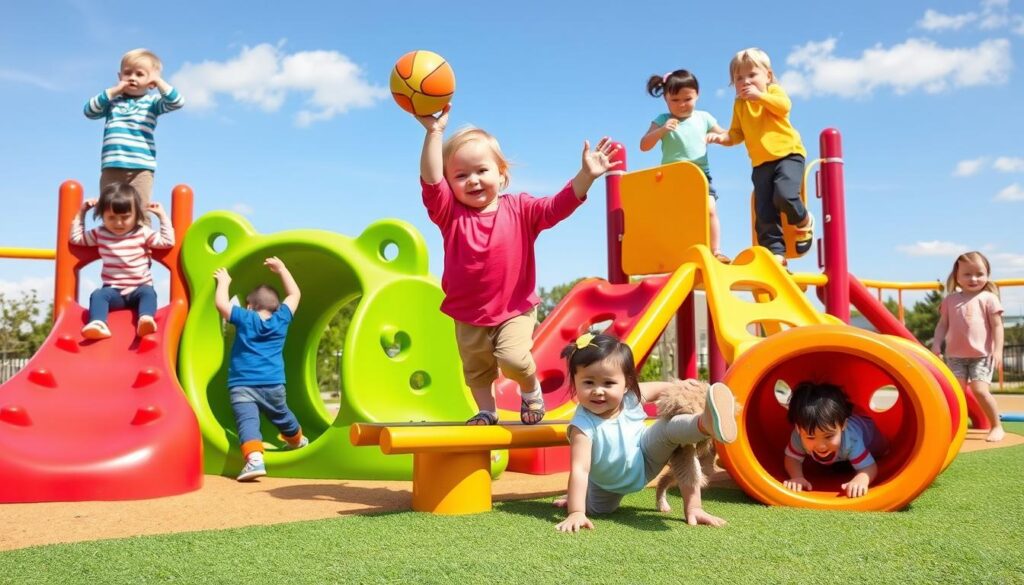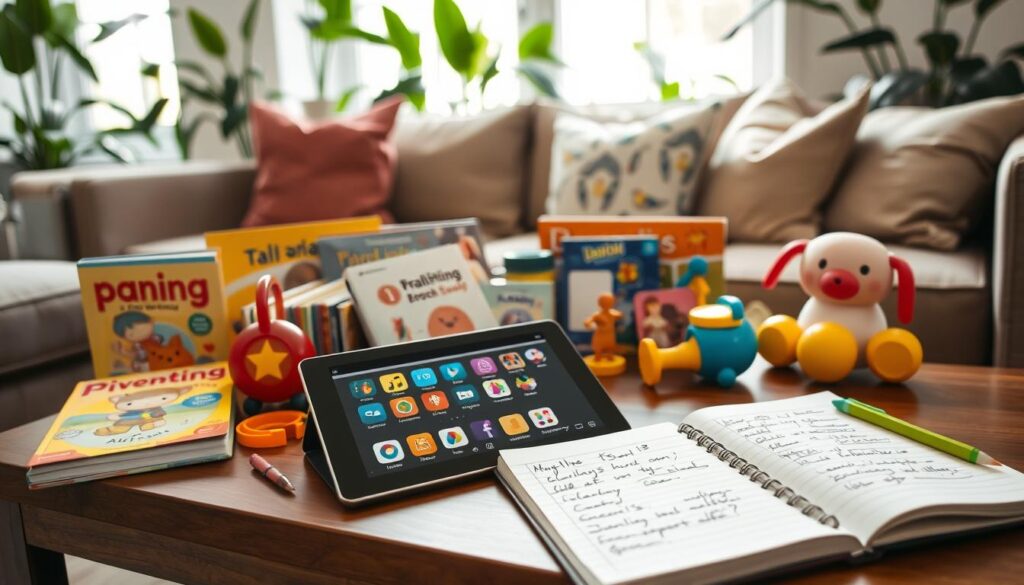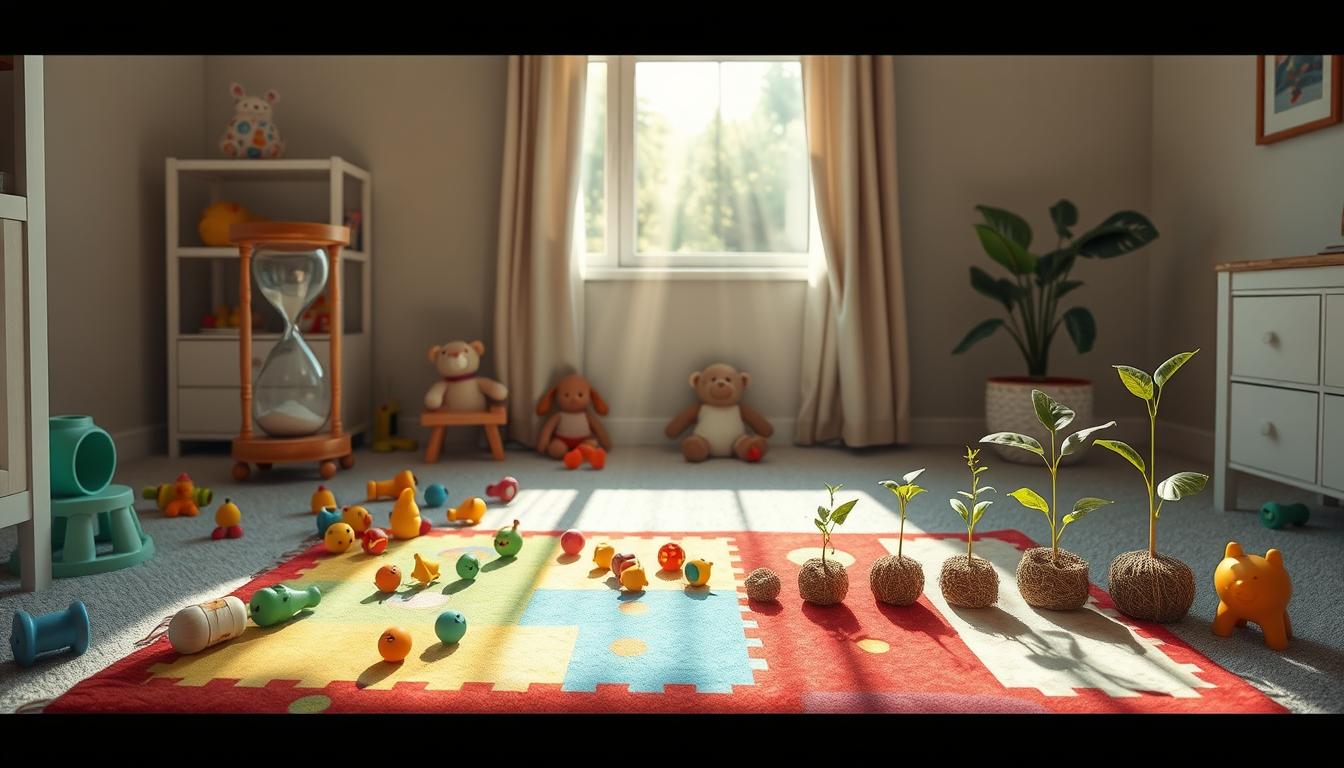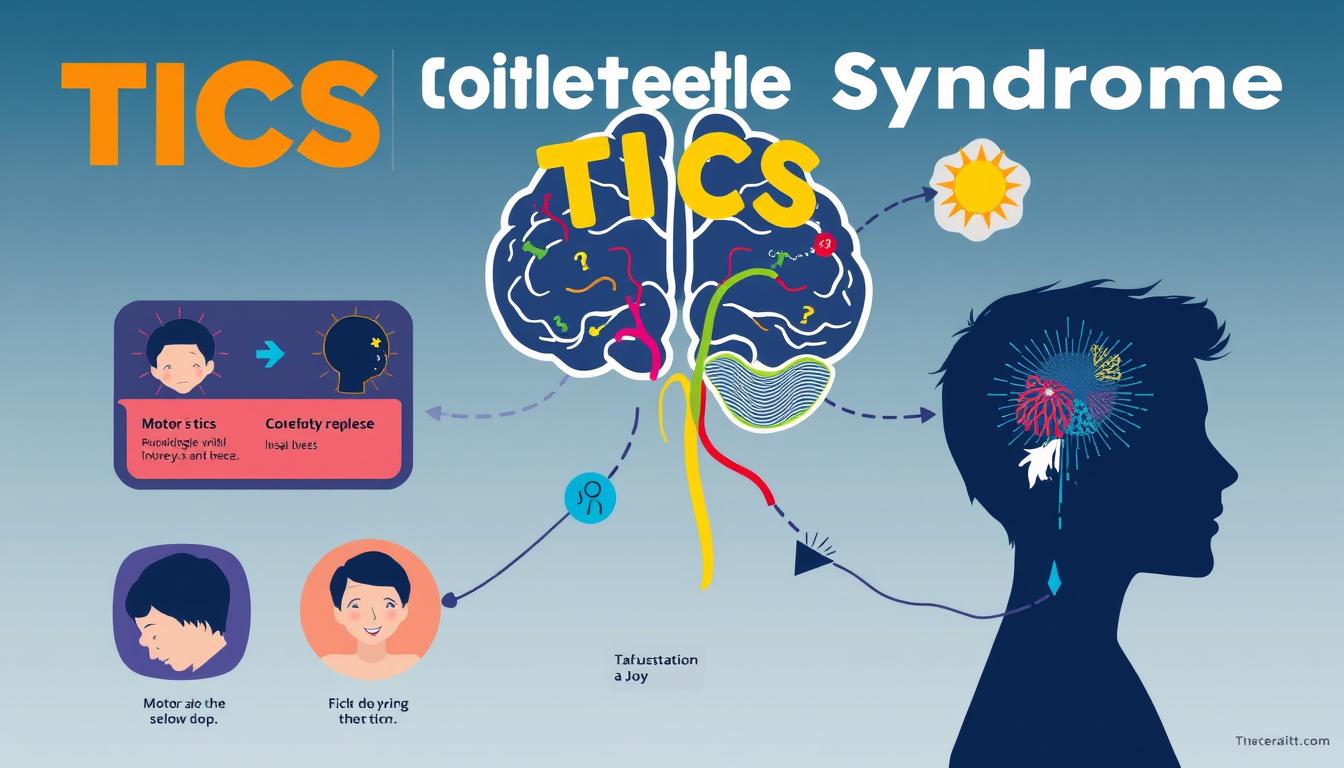As parents, we all want our little ones to thrive and reach their full growth. But, some toddlers may face developmental delays. This can worry us and make us wonder how to best support their growth. In this guide, we’ll dive into developmental delays in toddlers. We’ll look at the signs, types, and early intervention strategies.
By understanding child development, we can better support our children. This helps them succeed in their journey.
Key Takeaways
- Developmental delays in toddlers can affect various areas, including speech, motor skills, and social-emotional development.
- Early recognition and intervention are key to helping toddlers with developmental delays catch up.
- Parental involvement and access to specialized pediatric therapies can significantly impact a child’s progress.
- Collaborating with healthcare providers and specialists is vital for creating a complete support plan.
- Understanding the signs of developmental delays empowers parents to advocate for their child’s needs effectively.
What Are Developmental Delays in Toddlers
Developmental delays in toddlers mean a child’s skills don’t grow as expected. This can be in physical, cognitive, social, emotional, or language areas. Knowing about these delays helps parents and caregivers understand what’s normal and what’s not.
Common Types of Developmental Delays
Some common delays in toddlers include:
- Speech and language delays, which can affect a child’s ability to understand or express language
- Motor skill delays, which can impact a child’s gross (large) or fine (small) motor abilities
- Cognitive delays, which can affect a child’s problem-solving, learning, and reasoning skills
- Social and emotional delays, which can impact a child’s ability to interact with others and regulate their emotions
Normal vs. Delayed Development
All children grow at their own pace. But, if a child is far behind in reaching important developmental milestones, it might be a delay. Signs include late speech, trouble with motor skills, or issues with social interactions.
Risk Factors to Consider
Several things can increase the risk of developmental delays. These include premature birth, low birth weight, and genetic conditions. Also, toxins, medical issues, and socioeconomic status can play a part. Knowing these risk factors helps support a child’s development.
Understanding developmental delays, recognizing signs, and knowing risk factors helps parents and caregivers. They can work with healthcare providers to address concerns. This ensures children get the support they need to grow and thrive.
Understanding Developmental Delays in Toddlers: Key Signs and Symptoms
Every child grows at their own pace. Spotting developmental delays in toddlers is key for early help. Knowing the signs helps us support our children fully.
Look out for physical signs like delayed crawling or walking. Also, watch for cognitive signs like trouble learning or understanding language.
Don’t forget about social and emotional signs. A child with delays might struggle to make friends or show emotions. They might also act out more than usual.
Remember, every child is different. Some may take longer to reach milestones. But if you see persistent delays, it’s time to get help from a doctor or specialist.
“Early intervention is key when it comes to supporting children with developmental delays. The earlier we can identify and address any challenges, the better the long-term outcomes for our little ones.”
By watching our toddlers closely and getting help when needed, we can give them the care they deserve. Together, we can help them reach their full abilities.
| Developmental Domain | Potential Signs of Delay |
|---|---|
| Physical |
|
| Cognitive |
|
| Social-Emotional |
|
Speech and Language Development Concerns
Speech and language skills are key for a child’s growth. As parents, we often wonder if our kids are on track. Knowing the typical milestones and when to seek help is important.
Verbal Communication Milestones
Toddlers start babbling around 6 months and say their first words by 12 months. By 18-24 months, they use short phrases. Tracking these milestones helps spot speech delays early.
Non-verbal Communication Signs
Non-verbal skills are just as vital as verbal ones in language development. Watching our toddlers’ gestures and facial expressions is key. Signs like avoiding eye contact or not understanding simple instructions might indicate delays.
When to Worry About Speech Delays
If your child isn’t hitting the verbal communication milestones, or if you’re worried about their non-verbal signs, get professional advice. Early help can greatly improve their development.
“The earlier a child’s speech and language issues are identified and addressed, the better the outcome. Don’t hesitate to voice your concerns – your child’s development is the most important thing.”
Motor Skills Development and Red Flags
Toddlers grow and develop, showing their progress in physical abilities. Motor skills, both gross and fine, are key to their physical growth. Gross motor skills include big movements like walking and running. Fine motor skills involve small muscle movements, like grasping objects.
Motor skills in toddlers grow slowly, with each child moving at their own pace. Yet, some signs may show a delay in motor skills. These signs include:
- Difficulty or clumsiness in basic movements like sitting, crawling, or walking
- Lack of coordination in activities that require hand-eye synchronization
- Delays in reaching motor skill milestones, such as being unable to grasp objects or turn pages in a book by 12 months old
- Persistent difficulty with fine motor tasks, such as holding a pencil or using scissors
Early help is key for motor skill delays. It helps toddlers catch up and develop important physical skills. If you see signs of concern in your child’s motor skills, talk to your pediatrician or a pediatric physical therapist. With the right help, many motor skill delays can be managed and overcome.

“Fostering motor skill development in toddlers is essential for their overall physical, cognitive, and social-emotional growth.”
Social and Emotional Development Challenges
Toddlers grow up, and their social and emotional growth is key to their happiness. But, some kids might struggle with these areas. This could mean they’re facing delays or might have autism spectrum disorder.
Behavioral Indicators
Kids with social and emotional challenges might act out in certain ways. They could have trouble controlling their feelings, be aggressive, or find it hard to get along with others. It’s vital to watch for these signs.
Social Interaction Patterns
Some toddlers find it hard to connect with others. They might like to play alone, have trouble sharing, or not get social hints. These issues can show up in different ways.
Emotional Response Signs
Emotional growth can also be tough for some kids. They might find it hard to show their feelings, get very upset, or only show a few emotions. Spotting these signs is important for helping them grow.
If you see these challenges in your toddler, talk to your doctor or a child development expert. Early help can really help your child grow and tackle any problems they face.
“Understanding and addressing social and emotional development challenges in toddlers can lead to better outcomes and support their overall well-being.”
Early Intervention Strategies and Benefits
Early intervention is vital for toddlers with developmental delays. The first years of life are key for brain growth. Support during this time can greatly impact their development.
At [Company Name], we believe in early intervention’s power. It helps special needs children reach their highest level. Here are the main benefits:
- Improved developmental outcomes: Early intervention helps toddlers catch up in speech, motor skills, and social-emotional development.
- Enhanced communication and language skills: Special therapies address speech and language delays, helping toddlers express themselves well.
- Stronger social and behavioral skills: Early intervention guides parents and caregivers on positive social interactions and managing behaviors.
- Increased independence and self-confidence: The right support helps toddlers develop skills and confidence for daily life.
The sooner these interventions start, the better they work. We urge parents to seek support early. This can be through pediatricians, local programs, or specialized therapists.
| Early Intervention Strategies | Benefits |
|---|---|
| Speech and language therapy | Improved communication and language skills |
| Occupational therapy | Enhanced motor skills and independence |
| Behavioral therapy | Stronger social and emotional development |
| Parent education and support | Increased engagement and understanding of child’s needs |
Investing in early intervention helps toddlers with developmental delays. It builds a strong foundation for their future. To learn more about our programs, contact our team.
“The first few years of a child’s life are a critical window for brain development, and providing targeted support during this time can make a significant difference in their overall growth and progress.”
The Role of Pediatric Therapy in Development
Helping toddlers with developmental delays often needs a mix of approaches. Pediatric therapy is key in this journey. It includes speech, occupational, and physical therapy, making a big difference in a child’s growth.
Types of Therapeutic Interventions
Pediatric therapy offers many services for each child’s unique needs. Speech therapy boosts communication skills. Occupational therapy works on fine motor skills and daily tasks. Physical therapy focuses on big motor skills and physical health.
Finding the Right Specialist
Finding the right pediatric therapy can be tough. But, with the right help, parents can find the best fit for their child. Talking to healthcare providers, looking up local resources, and asking other parents for advice can help.
What to Expect in Therapy
Therapy sessions are fun and tailored to the child’s goals. Activities vary by therapy type, from games to sensory experiences. Parents are often involved, helping in their child’s development.
Adding pediatric therapy to a child’s care plan opens up many possibilities. It helps them overcome challenges and succeed in life.
“Pediatric therapy is not just about addressing delays; it’s about unlocking a child’s full potential and setting them up for a lifetime of success.”
Supporting Your Child’s Development at Home
As parents, we are key in helping our child grow at home. We can do many things to help, even when they see a therapist. We can use parenting resources, do fun activities, and help at home. This helps our child grow in many ways.
Embracing Parenting Resources
There are many resources for parents, like websites and forums. These help us learn about our child’s growth and find fun activities. They also let us connect with other parents who face similar challenges.
Fostering Developmental Activities
Doing activities with our child every day is very important. Here are a few examples:
- Reading together helps with language skills.
- Pretend play boosts imagination and social skills.
- Physical play, like climbing, improves motor skills.
Implementing Home-based Interventions
We can also do special things at home to help our child. This might include:
- Activities that help with sensory issues.
- Exercises that help with social and emotional skills.
- Using routines and schedules to make our child feel safe.
By using parenting resources, doing fun activities, and helping at home, we support our child’s growth. We work with professionals to create a caring environment. This helps our children reach their highest abilities.
“The most important thing that parents can do is to have a constructive, nurturing, and supportive relationship with their child.”
– Dr. John Gottman, Renowned Relationship Expert

Working with Healthcare Providers and Specialists
When dealing with developmental delays in toddlers, teamwork is key. As parents, we are essential in creating a support network. This ensures our child gets the care and help they need.
Building Your Support Team
Begin by working with your child’s pediatrician. They offer guidance and can refer you to specialists. These healthcare providers include physical therapists, occupational therapists, and speech-language pathologists. They help create a plan tailored to your child’s needs.
Documentation and Progress Tracking
It’s important to keep detailed records of your child’s progress. Track assessments, therapy sessions, and milestones. This helps you see how far your child has come and gives valuable info to specialists.
Insurance and Financial Considerations
Understanding insurance and financial help for developmental interventions can be tough. Learn about your insurance plan and look into financial aid like Medicaid. Healthcare providers can guide you on how to get the care your child needs without breaking the bank.
By working with a team of pediatricians, specialists, and other healthcare providers, your child gets the support they need. This helps them overcome developmental delays and thrive.
Conclusion
Understanding and tackling developmental delays in toddlers is key to their growth. Early intervention is essential. It helps us spot issues early and support our children’s development.
Working with healthcare providers and specialists is important. Together, we can create a plan to help with speech, motor, social, and emotional skills.
Parental involvement and a supportive home are critical. With consistent effort and professional help, our children can overcome challenges. Every child is different, and with the right support, they can thrive.
Let’s stay vigilant and proactive in supporting our children’s development. By using the strategies from this article, we can face developmental delays with confidence. This will help our toddlers grow and reach their full abilities.



